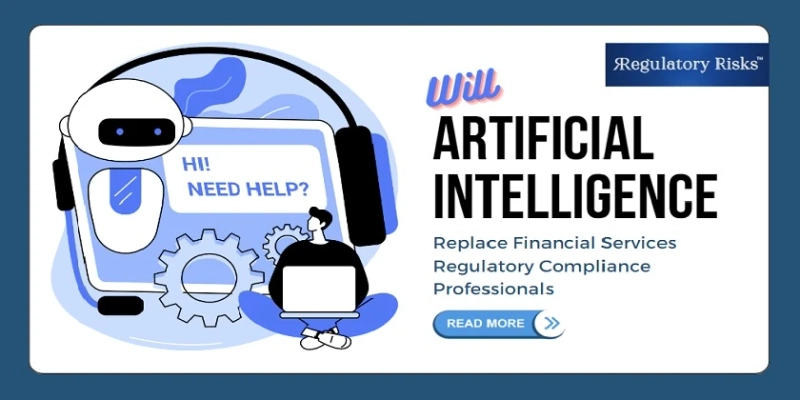The financial services industry is in the midst of a technological revolution, with artificial intelligence (AI) making significant inroads into various aspects of operations, including regulatory compliance, ESG and risk management. While AI brings about increased efficiency and accuracy, it has also raised questions about the potential replacement of human professionals, including those in regulatory compliance jobs. Will firms continue to need to hire a compliance officer in the future? In this article, we will explore the current landscape and the factors that determine whether AI will replace compliance consultants and risk management professionals.
The Role of AI in Regulatory Compliance
AI has already made a substantial impact on regulatory compliance in the financial services sector. It is used for various tasks, including risk assessment, monitoring transactions, and automating regulatory reporting. AI-powered systems can analyze vast amounts of data, identify anomalies, and provide insights that help organizations adhere to complex regulations.
1. Automation of Routine Tasks: AI can handle repetitive and time-consuming tasks with high accuracy, such as data entry and report generation. This frees up compliance and risk management professionals to focus on more complex and strategic compliance issues.
2. Enhanced Risk Management: AI-driven predictive analytics can identify potential compliance risks before they escalate, allowing professionals to take proactive measures.
3. Real-Time Monitoring: AI systems provide real-time monitoring of transactions and activities, reducing the chances of compliance violations going unnoticed.
4. Efficient Data Analysis: AI can process and analyze vast amounts of data much faster than humans, making it an invaluable tool for compliance professionals.
5. Customized Reporting: AI can generate customized compliance reports tailored to the specific needs of the organization, regulators, or stakeholders.
Challenges to Full Replacement
While AI brings many benefits to the field of financial services regulatory compliance, several challenges make it unlikely to fully replace human professionals:
1. Interpretation of Regulations: The interpretation and application of financial regulations often require a nuanced understanding of the industry, business models, and local laws. AI may struggle to navigate these complexities without human guidance.
2. Ethical and Regulatory Implications: Compliance consultants often deal with ethical considerations and legal implications of financial decisions. AI, as a tool, may not possess the moral or ethical judgment required in such situations.
3. Exception Handling: Complex, ambiguous, or unique situations may require judgment calls. Human professionals excel in handling exceptions, where AI systems might fall short.
4. Dynamic Regulatory Changes: Financial regulations are constantly evolving. Compliance professionals are required to adapt quickly to changing rules, which may be beyond the capabilities of AI without human oversight.
5. Stakeholder Relations: Compliance jobs often involve interactions with regulators, internal stakeholders, and clients. Building and maintaining these relationships require human interactions.
Rather than outright replacement, the future of AI in financial services regulatory compliance services are likely to be more about augmentation. AI will enhance the capabilities of compliance professionals, providing them with tools to work more efficiently, make informed decisions, and manage risk effectively. Human professionals can leverage AI's capabilities while retaining their expertise and judgment for nuanced situations.
While AI is revolutionizing financial services regulatory compliance, it is unlikely to replace human professionals entirely. Instead, the future lies in collaboration between AI and human experts, where AI automates routine tasks, monitors for risks, and provides valuable insights, while compliance professionals apply their judgment, industry knowledge, and adaptability to complex and evolving regulatory challenges.
Ultimately, the success of AI in financial services regulatory compliance hinges on how well it is integrated into the decision-making process, enabling compliance professionals to excel in their roles and meet the ever-evolving demands of the financial industry. AI is a valuable tool, but it is not a replacement for the expertise and human touch that compliance professionals bring to the table.
Explore Regulatory Risks unparalleled expertise in regulatory compliance, ESG and risk management, unravelling the true compliance meaning for businesses seeking top-notch professionals. The platforms global network of compliance consultants, compliance jobs, and regulatory compliance services can reduce the risk exposure of your business. Access, identify andhire a Chief Compliance Officer seamlessly – RegulatoryRisks.com.



